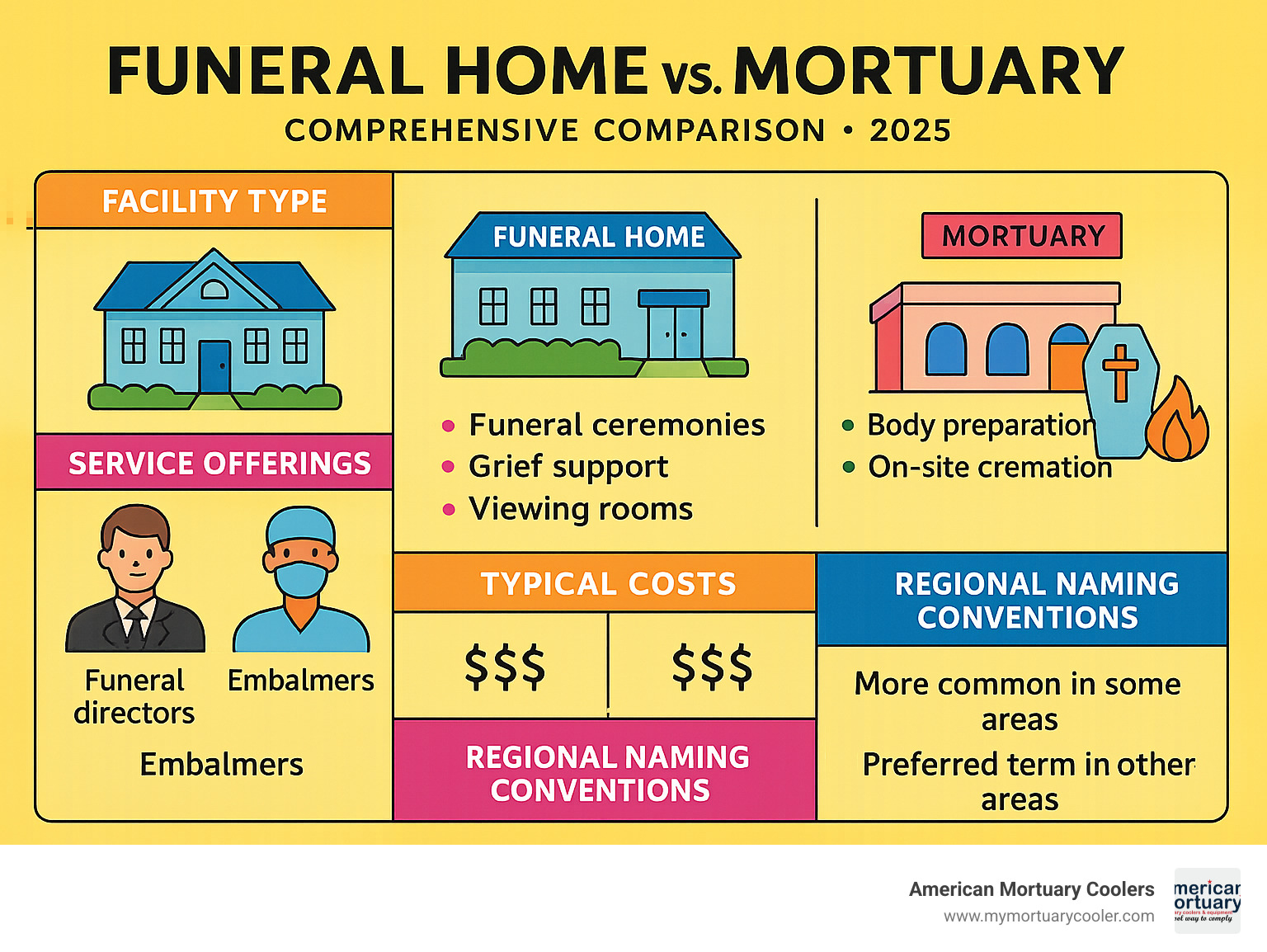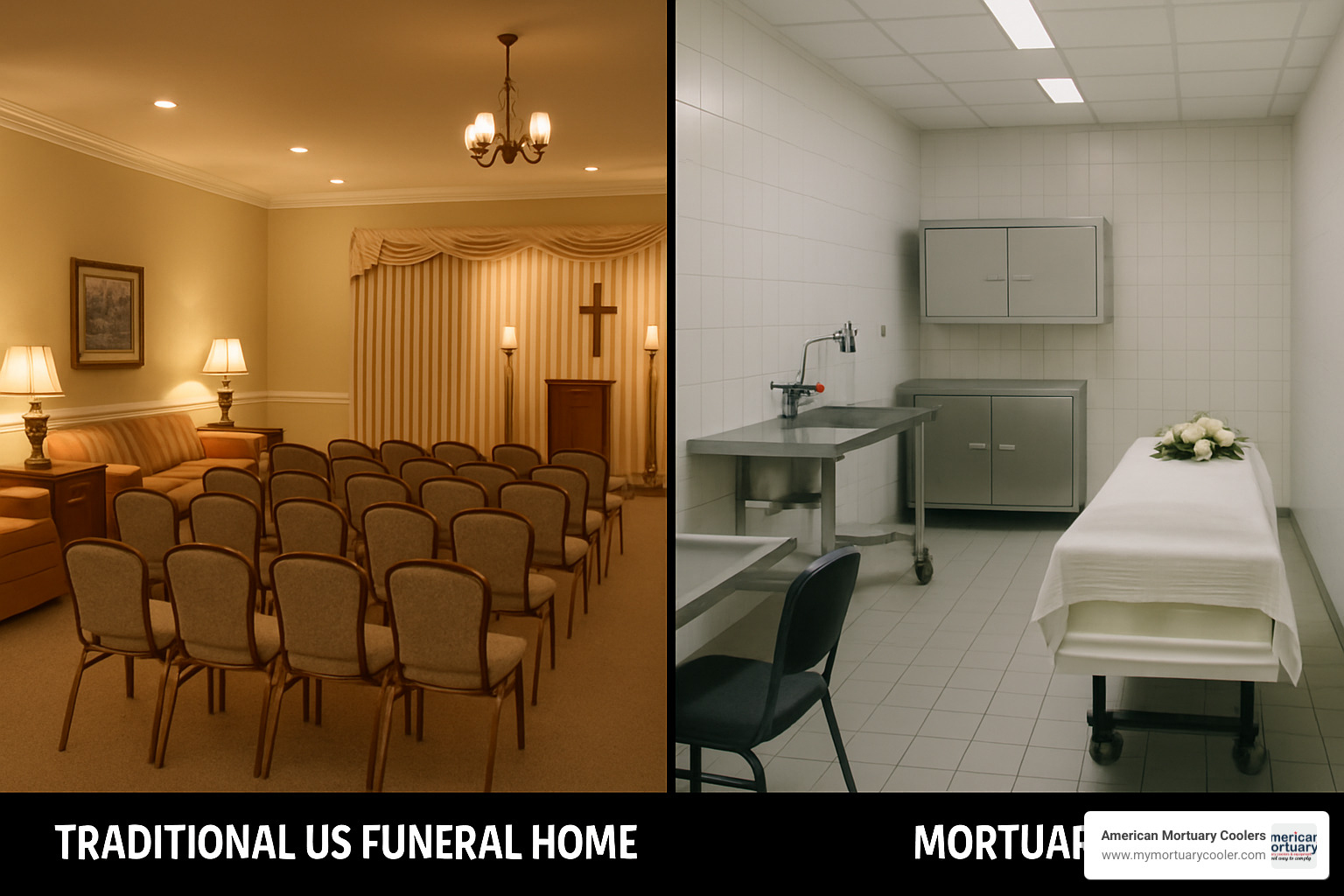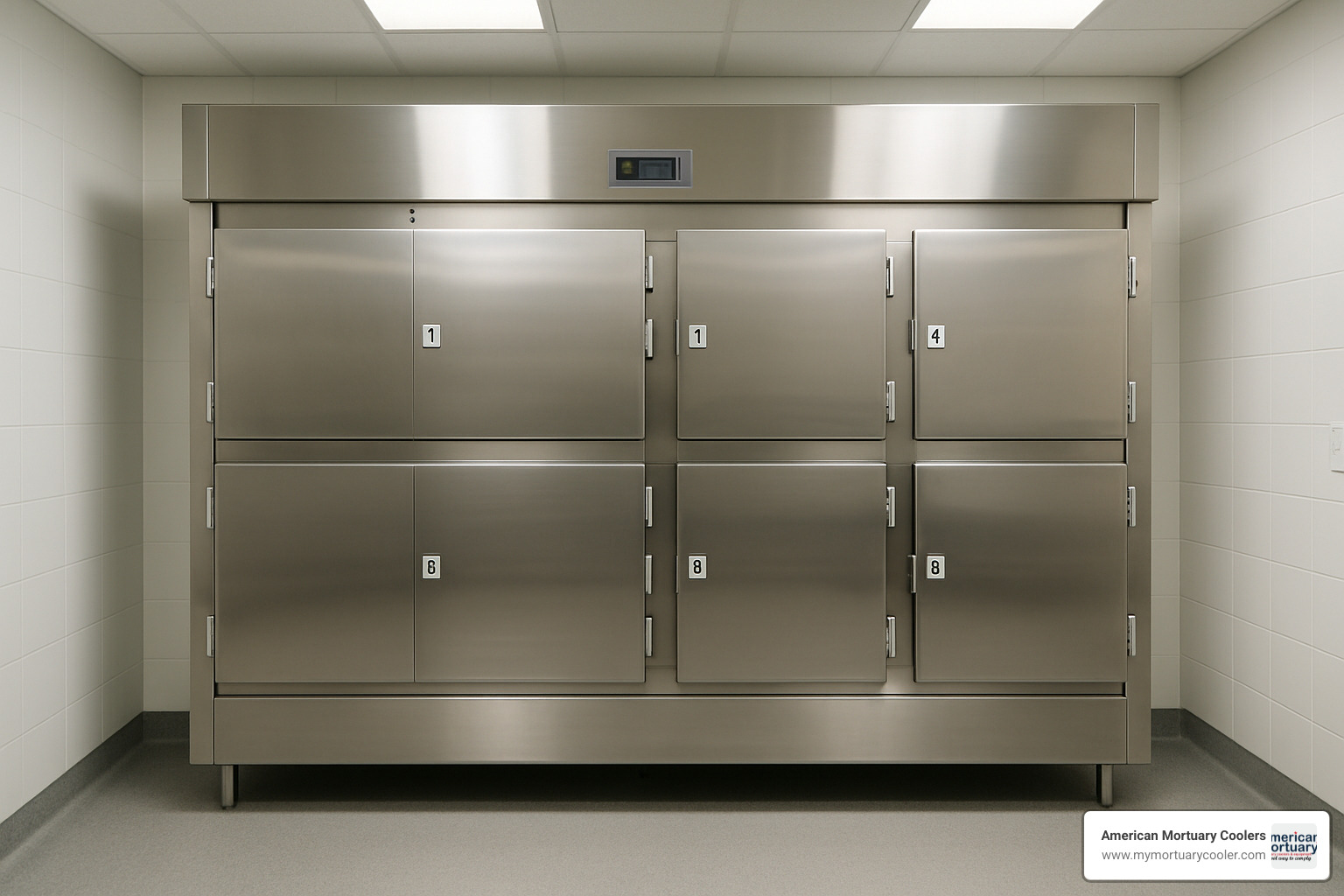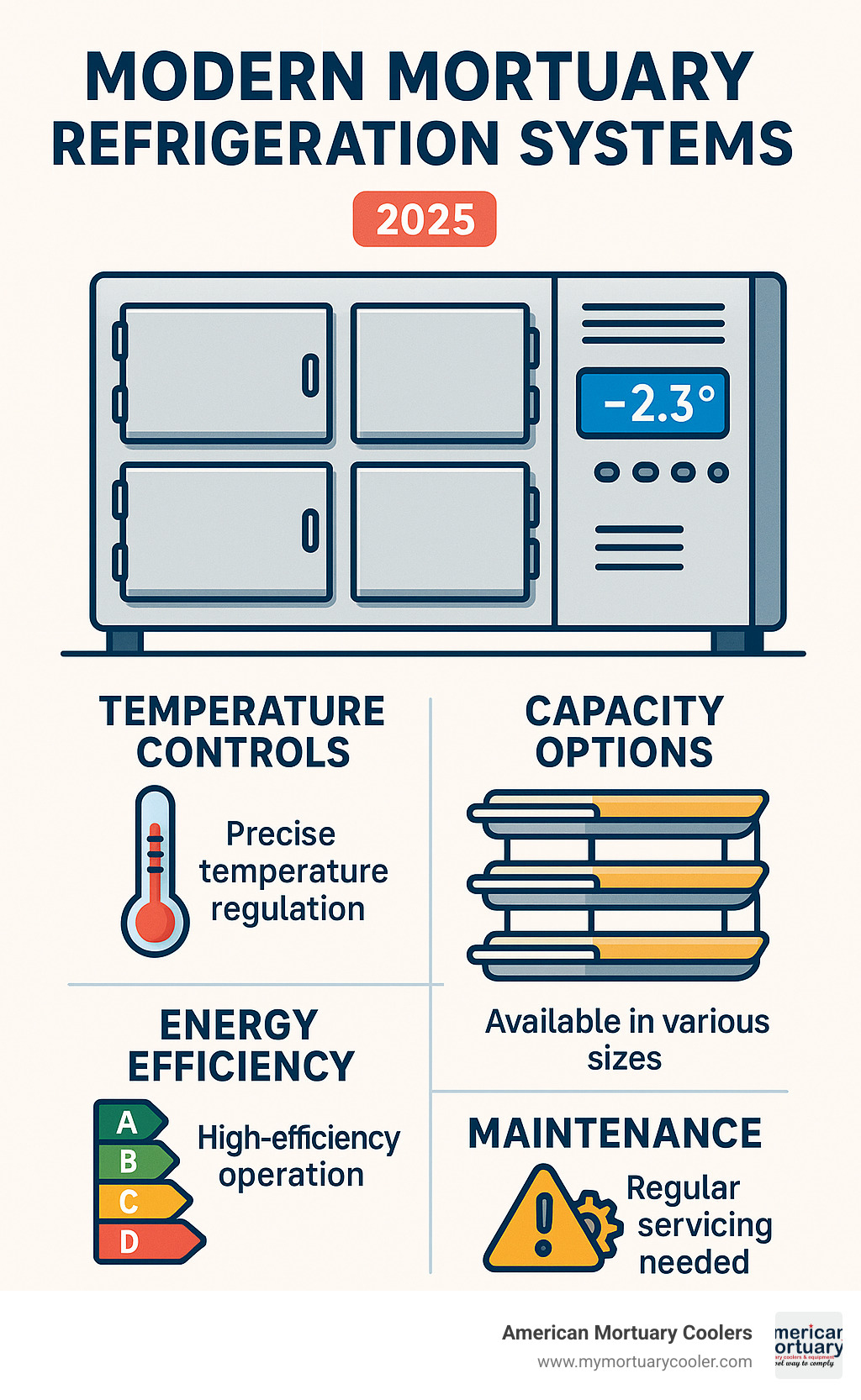Why Understanding Funeral Home and Mortuary Services Matters
When families face the loss of a loved one, choosing between a funeral home and mortuary can feel overwhelming during an already difficult time. While these terms are often used interchangeably, understanding their similarities and differences helps families make informed decisions about end-of-life services.
Quick Answer for Funeral Home and Mortuary:
- Funeral homes typically focus on full-service ceremonies, grief counseling, and family support with larger viewing spaces
- Mortuaries often emphasize technical body preparation and may offer on-site cremation facilities
- Both provide burial services, cremation options, and handle necessary paperwork and permits
- Cost differences vary by location and services, not necessarily by facility type
- Regional terminology differs - some areas prefer "funeral home" while others use "mortuary"
The death care industry in Canada is valued at approximately $1.6 billion, with over 1,200 funeral service locations across 12 provinces. With cremation rates reaching 73.1% and costs ranging from $895 for direct cremation to $10,000 for full-service funerals, families need clear guidance to steer their options.
I'm Mortuary Cooler, a national-level mortuary cooler supplier with experience in funeral home and mortuary operations and equipment needs across the United States. My background includes working directly with funeral directors to understand the technical requirements and operational challenges that both funeral homes and mortuaries face in providing dignified care.

Funeral home and mortuary basics:
Why This Guide Matters
Families in crisis need decision clarity during one of life's most challenging moments. In Canada, the Funeral Service Association handles around 85% of all funeral services, while U.S. trends show increasing demand for transparent pricing and personalized services. Understanding your options helps reduce both emotional stress and financial burden.
What Is a Funeral Home? What Is a Mortuary?
Think of a funeral home as your family's home away from home during a difficult time. These facilities focus on creating a comfortable, welcoming environment where families can gather, share memories, and say their goodbyes. You'll typically find spacious chapels for services, cozy viewing rooms, and staff trained to provide emotional support alongside practical arrangements.
A mortuary, on the other hand, puts more emphasis on the technical side of death care. While they absolutely care for families, their strength often lies in body preparation and preservation, with many offering on-site cremation facilities and specialized preparation areas.
Both types of facilities handle the mountain of paperwork that comes with death. They'll prepare and file legal documents, coordinate with cemeteries, arrange permits and death certificates, help write obituaries, and manage all the technical aspects of body preparation.
The real difference often comes down to atmosphere and emphasis. Funeral homes traditionally create "opulent surroundings centered on the comfort of surviving family members" - think comfortable seating areas, neat décor, and spaces designed for gathering. Mortuaries may prioritize efficiency and technical excellence while still maintaining dignity and respect.
Scientific research on grief support confirms that professional grief counseling significantly helps families work through bereavement, which is why many funeral home and mortuary directors receive training in both business operations and emotional support.
Evolution of the Funeral Home and Mortuary Profession
The story of death care goes way back - we're talking ancient Egypt, where specialized embalmers developed incredible techniques to prepare bodies for the afterlife. Fast-forward to the 1800s and early 1900s, when undertakers worked right from their own homes or small facilities.
As communities grew, so did the need for dedicated spaces. Undertakers began opening proper funeral homes with viewing parlors and chapels, while the term "mortuary" emerged from medical facilities that handled body storage and preparation.
Today's funeral directors are a far cry from those early undertakers. They study mortuary sciences, learn business operations, and receive training in grief counseling. It's a profession that's evolved from purely technical work into comprehensive family support.
Funeral Home and Mortuary Terminology Around the World
Where you live often determines what you call these facilities. In northern U.S. states, you're more likely to hear "funeral home," while southern regions often prefer "mortuary." Canada keeps things simple - with a cremation rate of 73.1%, both terms get used interchangeably regardless of what services the facility actually provides.
The industry itself is shifting toward friendlier terms like "celebration of life centers" and "tribute centers." It reflects how people's attitudes about death and memorialization are changing - moving away from somber formality toward more personalized, life-affirming approaches to saying goodbye.
Funeral Home and Mortuary: Key Differences & Similarities

Here's the truth about funeral home and mortuary services: the lines between them have blurred significantly over the years. While your grandmother might have seen clear differences between these facilities, today's families often find that both types of providers offer remarkably similar services.
Both funeral homes and mortuaries handle the essential tasks families need during difficult times. They prepare and care for your loved one with dignity, manage all the legal paperwork and permits, coordinate burial and cremation services, and guide families through planning decisions.
The real differences lie in emphasis and approach rather than basic capabilities. Funeral homes traditionally focus on creating memorable ceremonies with spacious chapels that can seat 100 or more people. They often employ staff trained extensively in grief counseling and family support.
Mortuaries typically emphasize efficient, dignified care with more utilitarian facilities. They often offer on-site cremation services, while many funeral homes still outsource cremation to external facilities.
| Feature | Funeral Home | Mortuary |
|---|---|---|
| Service Focus | Full-service ceremonies and family support | Technical preparation and efficient processing |
| Facility Size | Larger chapels and viewing rooms | More compact, utilitarian spaces |
| Cremation | Often outsourced to external crematories | Frequently offers on-site cremation |
| Staff Training | Emphasis on grief counseling | Focus on mortuary sciences |
| Cost Structure | May include ceremony and facility fees | Often more cost-effective for basic services |
Cost differences between funeral homes and mortuaries aren't automatic - you'll find expensive mortuaries and budget-friendly funeral homes. The key is understanding what services matter most to your family.
Primary Keyword FAQ - Choosing a Funeral Home and Mortuary
When families ask me about choosing between a funeral home and mortuary, I always start with one question: What does your family need most right now?
If emotional support is your priority, funeral homes often provide more extensive grief counseling and family guidance. If you prefer straightforward, efficient service, mortuaries might be your better choice. They excel at providing dignified care without elaborate extras, which can mean significant cost savings.
Cremation preferences can influence your decision too. Many mortuaries offer on-site cremation, meaning your loved one never leaves their care. Some families find this reassuring.
Comparing Funeral Home and Mortuary Facilities
Chapel and viewing spaces reveal the most obvious differences between facilities. Funeral homes typically invest in larger chapels designed for public ceremonies, complete with professional sound systems and seating for extended family and community members.
Mortuaries often feature more intimate viewing spaces, designed primarily for immediate family gatherings. However, many modern mortuaries have expanded their ceremony capabilities.
Preparation rooms are where the real technical work happens, and both facility types need professional spaces for embalming, body preparation, and cosmetic restoration. More info about Preparation Rooms explains the specialized requirements these areas must meet.
Refrigeration systems are essential for both funeral homes and mortuaries to maintain proper body storage and ensure dignified care throughout the service process.
Services Offered A-Z: From Arrangements to Aftercare
When you're facing the loss of a loved one, understanding what services are available can bring some comfort during an overwhelming time. Both funeral homes and mortuaries offer comprehensive death care services, though they might approach things a bit differently.
The journey typically begins with initial arrangements where you'll sit down with a funeral director to plan the service. They'll walk you through options for body preparation, including embalming and cosmetic restoration. Whether you choose cremation services or traditional burial, these professionals handle all the technical details with care and respect.
Many families appreciate grief support services that extend beyond the funeral itself. Pre-planning services allow people to make their own arrangements in advance, lifting that burden from their families.
The practical side involves quite a bit of paperwork - death certificates, burial permits, Social Security notifications, insurance forms, cemetery documentation, and medical examiner releases. Your funeral director handles most of this administrative work.
Funeral Home Services Deep Dive
Funeral homes really shine when it comes to creating meaningful ceremonies that bring people together. Their spacious chapels can accommodate large gatherings where friends, family, and community members can pay their respects during viewing and visitation services.
Modern funeral homes have acceptd technology in touching ways. Memorial videos help tell your loved one's story through photos and music. Online memorial websites let distant relatives participate, and live-streaming services ensure no one has to miss saying goodbye.
What sets many funeral homes apart is their focus on grief counseling. Funeral directors often receive specialized training in bereavement support, and some facilities host ongoing support groups.
Mortuary Services Deep Dive
Mortuaries excel at the technical side of death care while maintaining the highest standards of dignity and respect. Their staff are trained in mortuary sciences, which includes advanced embalming techniques, anatomical restoration, and cosmetic application.
One significant advantage many mortuaries offer is on-site cremation. This means your loved one never leaves their care, which provides peace of mind about the chain of custody. It often reduces costs too, since there's no need to transport to an external facility.
For families who prefer simple, efficient services, mortuaries can often provide rapid processing for direct cremation or immediate burial.
More info about funeral home supplies explains the specialized equipment and materials that make professional mortuary operations possible.
Cremation & Burial: What Both Providers Offer
Both funeral homes and mortuaries can handle cremation and burial services, though their approach might differ slightly.
Direct cremation is the most affordable option, typically costing $895-$1,595 in Canada. This is cremation without a ceremony, though families often hold their own memorial service later. Cremation with a memorial service allows for a ceremony before or after the cremation, while full-service cremation funerals include a traditional funeral service followed by cremation.
For burial services, you might choose a traditional burial with a full funeral service and graveside committal. Direct burial means immediate burial without a ceremony, which costs less but still provides dignity. Green burial is becoming more popular - it's an eco-friendly option without embalming or metal caskets.
Both types of facilities help with urn and casket selection, coordinate with cemeteries, arrange headstones and memorial markers, and can even handle sea scattering services where it's permitted.
Scientific research on cremation rates shows that over 73% of Canadians now choose cremation, reflecting changing attitudes about end-of-life services and environmental concerns.
Costs, Regulations & How to Choose the Right Provider
When families are already dealing with grief, the last thing they need is confusion about costs or legal requirements. Understanding the financial and regulatory landscape of funeral home and mortuary services helps you make confident decisions without added stress.
Pricing transparency is the law. The Federal Trade Commission's Funeral Rule requires all funeral providers - whether they call themselves funeral homes or mortuaries - to give you a detailed General Price List (GPL) upfront. This means you can compare prices between different providers without any guesswork or surprise fees.
Canadian families typically spend between $895 for direct cremation and $10,000 for full-service funerals. The wide range reflects different service levels and regional variations. Urban areas generally cost more than rural locations, and corporate chains often charge significantly more than family-owned facilities.
More info about choosing a funeral home and services walks you through the evaluation process step by step.
Budgeting for Funeral Home and Mortuary Expenses
Direct cremation costs $895 to $1,595 and includes the basics: picking up your loved one, the cremation process, and returning the ashes to you. No viewing, ceremony, or fancy casket - just dignified, simple care.
Full funeral services range from $6,000 to $10,000 and include everything: embalming, viewing time, ceremony space, transportation, casket, and either burial or cremation. Cemetery costs, headstones, and flowers usually cost extra - these "cash advance" items can add another $2,000 to $5,000 to your final bill.
Payment doesn't have to happen all at once. Most funeral homes and mortuaries accept various payment methods including pre-need insurance policies, life insurance assignments, and payment plans. Veterans benefits and Social Security death benefits can help offset costs too.
Legal & Regulatory Considerations
Whether you choose a funeral home or mortuary, they all follow the same strict rules. Licensing requirements are identical for both types of facilities, so you're protected by the same legal standards either way.
Federal oversight includes the FTC Funeral Rule for pricing transparency, OSHA safety standards for workers, and EPA regulations for cremation facilities. State and provincial licensing covers funeral director certification, facility inspections, crematory permits, and embalming qualifications.
Required paperwork includes death certificates, burial or cremation permits, transportation permits, and medical examiner releases when needed. Your chosen provider handles most of this paperwork for you - it's part of what you're paying for.
The regulatory framework ensures that families receive professional, dignified care regardless of which type of facility they choose. Both funeral homes and mortuaries must meet these same high standards to maintain their licenses.
Modern Trends: Sustainability, Technology & Equipment

The funeral home and mortuary industry is changing faster than ever before. Families today want services that reflect their values while maintaining the dignity and respect their loved ones deserve.
Green burial practices are becoming mainstream as families seek environmentally conscious options. More facilities now offer biodegradable caskets made from willow, bamboo, or recycled cardboard. Natural burial grounds allow bodies to decompose naturally without concrete vaults or metal caskets.
Digital technology is changing how families memorialize their loved ones. Live-streaming services became essential during the pandemic and remain popular for connecting distant relatives. Virtual reality memorial experiences allow families to create immersive tributes that can be revisited for years to come.
Online arrangement platforms using tools like DocuSign and video chat make planning services more convenient during difficult times. Digital memorial websites and QR codes linking to online tributes give families new ways to share memories and celebrate lives.
Behind the scenes, advanced refrigeration equipment ensures proper care throughout the service process. Modern mortuary coolers provide precise temperature control and energy efficiency that both funeral homes and mortuaries depend on for maintaining dignity and meeting health regulations.

The refrigerated chain of custody has become more important as families demand transparency about how their loved ones are cared for. Professional facilities invest in reliable cooling systems that maintain consistent temperatures and provide backup power protection.
American Mortuary Coolers has seen increasing demand for custom refrigeration solutions that meet each facility's unique needs. Our Tennessee-based team delivers custom mortuary coolers nationwide, helping both funeral homes and mortuaries maintain the highest standards of care. More info about body coolers explains what to look for when selecting refrigeration equipment.
Eco-Friendly and High-Tech Innovations
Alkaline hydrolysis, also known as water cremation, offers an eco-friendly alternative to traditional flame cremation. This process uses heated water and alkaline chemicals to accelerate natural decomposition, producing 90% fewer emissions than conventional cremation.
Biodegradable urns that dissolve in water or soil are gaining popularity among environmentally conscious families. Some urns contain tree seeds, allowing families to grow memorial trees from their loved one's remains.
Facility modernization is happening across the industry as both funeral homes and mortuaries upgrade their equipment and spaces. Energy-efficient HVAC systems reduce operating costs while modern preparation rooms improve working conditions for staff.
Flexible ceremony spaces that can accommodate various cultural and religious traditions reflect our increasingly diverse communities. Some facilities now feature moveable walls, adjustable lighting, and multimedia capabilities that can transform spaces for different types of services.
These innovations help death care providers serve families better while operating more efficiently and sustainably.
Frequently Asked Questions about Funeral Home and Mortuary Choices
When families face end-of-life decisions, they often have similar questions about choosing between different providers. Here are the most common concerns we hear from families navigating these difficult choices.
Are funeral homes and mortuaries the same thing?
The short answer is that funeral homes and mortuaries provide essentially the same core services - they both care for your loved one, help plan ceremonies, handle all the paperwork, and support your family through the grieving process.
Where they differ is more about style and emphasis than actual capabilities. Funeral homes traditionally put more focus on the ceremonial side of things. They often have larger viewing rooms, more elaborate chapels, and staff who spend extra time on grief counseling and family support.
Mortuaries tend to emphasize the technical side - they're often really good at body preparation and many have their own cremation facilities right on-site. If you prefer efficient, straightforward service without a lot of ceremony, a mortuary might be a better fit.
These lines are getting blurrier every year. Many modern mortuaries offer beautiful ceremony spaces and extensive family support, while funeral homes are investing in their own cremation equipment and streamlined services.
The name choice often comes down to regional preferences or just what the owner decided to call their business. Don't get too hung up on the title - focus on whether the specific facility meets your family's needs.
Do both provide on-site cremation and burial?
When it comes to burial services, both funeral homes and mortuaries handle everything you need. They'll coordinate with the cemetery, arrange the graveside service, get all the permits, and manage the logistics. There's really no difference here.
Cremation is where things get more interesting. Many mortuaries operate their own cremation facilities right on the premises. This means your loved one never leaves their care, which gives many families peace of mind about the chain of custody. Plus, it often costs less because there are no transportation fees to an outside crematory.
Many funeral homes, especially smaller ones, work with separate cremation facilities. They'll handle all the arrangements and coordination, but the actual cremation happens at a different location.
When you're choosing a provider, ask directly about their cremation arrangements. Questions like "Do you perform cremations on-site or do you use an outside facility?" and "How do you ensure the chain of custody?" will help you understand exactly what to expect.
How can pre-planning ease family stress?
Pre-planning is honestly one of the best gifts you can give your family. When someone dies, families are dealing with grief, shock, and often time pressure to make important decisions. Having plans already in place removes so much of that burden.
The emotional benefits are huge. Your family won't have to guess what you would have wanted or argue about different preferences. They'll know your wishes and can focus on supporting each other instead of making difficult decisions under pressure.
Financially, pre-planning makes a lot of sense too. You can lock in current prices, which protects against inflation - and funeral costs do tend to rise over time. Many facilities offer payment plans that let you spread the cost over months or years.
Both funeral homes and mortuaries offer pre-planning services, and most will sit down with you for a consultation at no charge. They'll walk you through all your options without any pressure to decide immediately.
Pre-planning also gives you time to shop around and compare options when you're not under emotional stress. You can visit different facilities, ask questions, and make thoughtful decisions about what feels right for you and your budget.
Conclusion & Next Steps
When families face the difficult choice between a funeral home and mortuary, both provide compassionate, professional care during life's most challenging moments. The name on the door matters far less than the people inside who will guide you through this journey.
What truly matters is finding a provider who listens to your family's needs, respects your budget, and offers the services that feel right for honoring your loved one. Whether that's a traditional funeral home with spacious chapels or a mortuary focused on efficient, dignified care, the right choice is the one that brings your family peace.
Planning ahead gives you confidence when difficult times arrive. Pre-planning removes the pressure of making complex decisions while grieving and ensures your wishes are clearly documented. Both funeral homes and mortuaries offer pre-planning consultations, often at no charge.
Emotional support remains paramount throughout this process. Look for providers who demonstrate genuine compassion, answer your questions patiently, and offer ongoing grief resources. The technical aspects of body preparation and logistics are important, but the human connection makes all the difference.
Sustainable choices are increasingly available for families who want to minimize environmental impact. From green burials to eco-friendly cremation options, both facility types are adapting to meet these evolving preferences while maintaining dignity and respect.
Your next steps should include researching local providers by visiting facilities and requesting their General Price List for transparent pricing. Consider your specific needs - do you want on-site cremation, large ceremony spaces, or cost-effective basic services? Ask about modern amenities like live-streaming for distant relatives or digital memorial options.
At American Mortuary Coolers, we've worked with hundreds of funeral homes and mortuaries across the United States, providing custom refrigeration solutions that ensure dignified care throughout the service process. Our equipment supports facilities of all sizes in maintaining the highest standards, regardless of whether they call themselves a funeral home or mortuary.
The death care industry continues evolving to serve families better while preserving its core mission of providing comfort during grief. Modern facilities accept technology, offer sustainable options, and focus on personalized services that truly celebrate each life.
For families facing immediate needs, both funeral homes and mortuaries provide 24/7 support and can walk you through every decision step by step. Don't hesitate to ask questions, compare your options, and choose the provider who makes you feel most comfortable and supported.
More info about American mortuary solutions - We deliver reliable, custom mortuary coolers nationwide, supporting funeral service providers in maintaining exceptional standards of care and dignity for every family they serve.




















